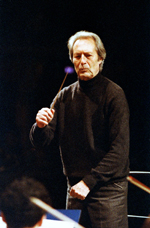Carlo Maria Giulini
Carlo Maria Giulini (May 9, 1914 – June 14, 2005) was an Italian conductor, and violist.
Biography
Giulini was born in Barletta, Italy and studied the viola and composition at the Accademia Nazionale di Santa Cecilia in Rome. He later studied conducting with Bernardino Molinari.[1]
Giulini worked at Milan Radio from 1946 to 1951, where he revived several obscure operas, including works by Alessandro Scarlatti. Arturo Toscanini heard a production of Haydn's Il mondo della luna; this led Toscanini to recommend Giulini for the musical directorship at La Scala, where he remained from 1953 to 1956.
In 1958, Giulini conducted a highly acclaimed production of Verdi's Don Carlos at the Royal Opera House, Covent Garden. During the 1960s, he was in great demand as a guest conductor of leading orchestras around the world, and made numerous well-received recordings with the Philharmonia Orchestra of London and several others.
After 1968 Giulini abandoned opera, as a result of not wanting to compromise his artistic vision, concentrating instead on orchestral works. He served as principal guest conductor of the Chicago Symphony from 1969 to 1978, and he was named music director of the Vienna Symphony in 1973. From 1978 to 1984, he served as principal conductor and Music Director of the Los Angeles Philharmonic, launching his tenure there with performances of Beethoven's 9th Symphony. In 1982 he returned once more to opera, conducting a controversial production of Verdi's Falstaff.
Giulini's most notable opera recordings include the 1959 Philharmonia Orchestra and Chorus versions of Mozart's operas Le Nozze di Figaro and Don Giovanni for EMI, as well as his 1955 recording of Verdi's La Traviata with Maria Callas. Admired orchestral records include Debussy's La Mer and Nocturnes, Dvořák's 9th Symphony and Tchaikovsky's 6th Symphony with the Philharmonia Orchestra, Mussorgsky's Pictures at an Exhibition, Brahms's 4th Symphony and Mahler's 1st and 9th Symphonies with the Chicago Symphony Orchestra, Beethoven's 3rd and 5th Symphonies, and Schumann's 3rd Symphony with the Los Angeles Philharmonic Orchestra, Mahler's Das Lied von der Erde with the Berlin Philharmonic Orchestra, Brahms's four Symphonies, Bruckner's 7th, 8th and 9th symphonies with the Vienna Philharmonic, and Dvořák's 7th Symphony with the Royal Concertgebouw Orchestra of Amsterdam. Most of these discs were recorded for the Deutsche Grammophon label.
Giulini and wife, Marcella (d. 1995), had three children.[2] He died in Brescia, Italy at age 91. [1]
Awards and recognitions
- Gramophone Award
- Grammy Award for Best Choral Performance
- 1981 Mozart: Requiem; Norbert Balatsch (choirmaster) / Philharmonia Orchestra & Chorus
- Grammy Award for Best Classical Album
- Grammy Award for Best Engineered Album, Classical
- Grammy Award for Best Instrumental Soloist Performance
- Grammy Award for Best Orchestral Performance
See also
References
- ^ "Carlo Maria Giulini Obituary". The Guardian. 2005-06-16. Retrieved 2007-04-13.
- ^ "Carlo Maria Giulini Obituary". Telegraph. 2005-06-16. Retrieved 2007-04-13.
- ^ "1981 Gramophone Awards". Infoplease.com. 2007-01-11. Retrieved 2007-01-11.

